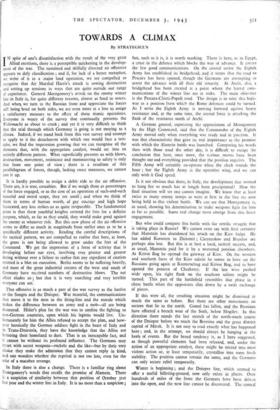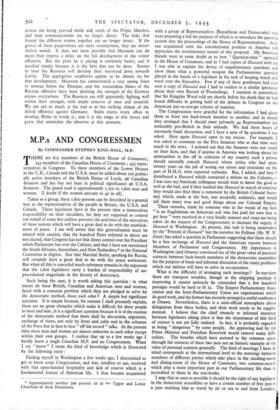TOWARDS A CLIMAX
By STRATEGICUS
IN spite of one's dissatisfaction with the result of the very great Allied exertions, there is a perceptible quickening in the develop- ment of the war. The sustained and skilfully directed air offensive appears to defy classification ; and if, for lack of a better metaphor, we write of it as a major land operation, we are compelled to recognise that Air Marshal Harris's attack is sowing destruction and setting up tensions in ways that are quite outside our range of experience. General Montgomery's attack on the enemy winter line in Italy is, for quite different reasons, almost as hard to assess. And when we turn to the Russian front and appreciate the forces still being used on both sides, we are even more at a loss to assign a satisfactory measure to the effect of these titanic operations. Everyone is weary of the survey that continually presents the Wehrmacht as about to crack ; and yet it is very difficult to think that the trial through which Germany is going is not mozing to a climax. Indeed, if we stand back from this vast survey and attempt to apply to it the detachment with which one would face a test- tube, we find the impression growing that we can recognise all the elements that, with the appropriate catalyst, would set into an entirely different pattern. What superficially presents us with blows, destruction, movement, resistance and manoeuvring to safety is only that from one point of view ; there is a resultant of this parallelogram of forces, though, lacking exact measures, we cannot cast it up.
It is hardly possible to assign a debit side to the air offensive. There are, it is true, casualties. But if we weigh them as percentages of the force engaged, or as the cost of an operation of such-and-such material and moral scope, they are small ; and when we think of them in terms of human worth, of gay courage and high hope frustrated, any loss strikes us as quite irreparable. The fundamental point is that these youthful knights entered the lists for a definite purpose, which, as far as they could, they would make good against the enemy at whatever risk. But this new phase of the air offensive seems to differ so much in magnitude from earlier ones as to be a specifically different activity. Reading the careful descriptions of the tactical pattern, we are compelled to realise that here, at least, the grass is not being allowed to grow under the feet of the Command. We get the impression of a form of activity that is developing before our eyes, involving ever_ greater and greater daring without ever a failure to realise that any expedient of caution omitted is a blot on execution. Berlin seems to be suffering heavily, and most of the great industrial centres of the west and south of Germany have received numbers of destructive blows. The net effect eludes us ; but that it is very searching and very terrible everyone can see.
That offensive is as much a part of the war survey as the battles on the Sangto and the Dnieper. War material, the communications that move it to the men in the firing-line and the morale which makes the difference between an army and a mob—all are being destroyed. Hitler's plan for the war was to confine the fighting to non-German countries, upon which his legions would live. Un- fortunately for him the Allies refused to accept the plan, and how- ever heroically the German soldiers fight in the heart of Italy and in Trans-Dniestria, they have the knowledge that the Allies are battering their homeland to dust. That is an inescapable fact, and it cannot be without its profound influence. The Germans may retort with secret weapons—rockets and the like—but by their very choice they make the admission that they cannot reply in kind, and one wonders whether the reprisal is not too late, even for the sake of a macabre revenge.
In Italy there is. also a change. There is a familiar ring about Montgomery's words that recalls the promise of Alamein. There is a suspicion of similarity between that position of October pst last year and the winter line in Italy. It is no more than a suspicion ; but, such as it is, it is worth marking. There is here, as in Egypt, a crust in the defence which •blocks the way of advance. It covers
the few good communications. On the coastal sector the Eighth Army has established its bridgehead, and it seems that the road to Pescara has been opened, though the Germans are attempting to arrest the advance with all their old tenacity. At Archi, also, a bridgehead has • been created at a point where the lateral com- munications of the winter line are at stake. The main objective is the Pescara-Chieti-Popoli road. The design is to seize this high- way as a position from which the Rome defences could be turned. As I write the Eighth Army is moving forward against heavy resistance and, at the same time, the coastal force is attacking the flank of the resistance north of Archi.
A German general, expressing the appreciation of Montgomery by the High Command, said that the Commander of the Eighth Army moved only when everything was ready and in position. It was that characteristic that gave its real importance to the promise with which the Alamein battle was launched. Comparing his words then with those used the other day, it is difficult to escape he conclusion that here, once more, the various moves have been thought out and everything provided that the position requires. The Fifth Army will certainly co-operate when the clock sounds the hour ; but the Eighth Army .is the operative wing, and we can only wish it God speed.
Is it not obvious that there, in Italy, the development that seemed to hang fire so much has at length been precipitated? How the fmal situation will set one cannot imagine. We know that at least twice as many enemy troops as were at first in the line are now being held to this violent battle. We can see that Montgomery is, as usual, showing his determination to make weapons fight for him as far as possible. Some real change must emerge from this fierce engagement.
But who could compare this battle with the terrific struggle that is taking place in Russia? We cannot even say with final certainty that Manstein has abandoned his attack on the Kiev bulge. He has added Korosten to Zhitornir ; Chernyakov and Brusilov are perhaps also lost. But this is at best a local, tactical success, and, as usual, Manstein paid for it by a worsened position elsewhere. At Krivoi Rog he opened the gateway of Kiev. On the western and southern faces of the Kiev salient he seems to have set the Russians going again at Kremenchug and Krivoi Rog, and to have opened the postern of Cherkassy. If the last were pushed wide open, his right flank on the southern salient might be turned. This part of the battlefield resembles that phase in a chess battle when the opponents slim down by a swift exchange of pieces.
If this were all, the resulting situation might be dismissed as much the same as before. But there are other movements on sectors that lie to the north. Gomel has fallen, and the Russians have effected a breach west of the Sozh, below Mogilev. In this direction there stands the last stretch of the north-south course of the Dnieper before we reach the Beresina and the great district capital of Minsk. It is not easy to read exactly what has happened here ; and, in the attempt, we should always be hanging at the heels of events. But the broad tendency is, as I have suggested, as though powerful elements had been released, and, under the action of an appropriate catalyst, these might be stirred into most violent action or, at least temporarily, crystallise into some fresh stability. The position cannot remain the same, and the Germans can only secure relief temporarily.
Winter is beginning ; and the Dnieper line, which seemed to offer a useful billeting-ground, now only exists in places. Over hundreds of miles of the. front the Germans have been driven into the open, and the new line cannot be discovered. The central armies are being pressed north and south of the Pripet Marshes, and their communications are no longer direct. The links that bound the different armies together are no longer intact. If the graver of these propositions are mere assumptions, they are never- theless sound. It does not seem possible that Manstein can do more than impose a delay on the full development of the winter offensive. But the price he is paying is extremely heavy, and is justified simply because it is the best that can be done. Sooner or later the Russians will develop their westward drive towards Latvia. The appropriate conditions appear to be almost set for that development. Manstein has concentrated a very strong force of armour below the Dnieper, and the tremendous blows of the Russian offensive have been draining the strength of the German armies everywhere. The Russians are still apparently fighting well within their strength, with ample reserves of men and material. We are not so much at the end as at the striking climax of the Allied offensive against Germany. Stalin exerts every effort to develop, Hitler to avoid, it ; and it is the range of this thrust and parry that astonishes the observer at this moment.



























 Previous page
Previous page